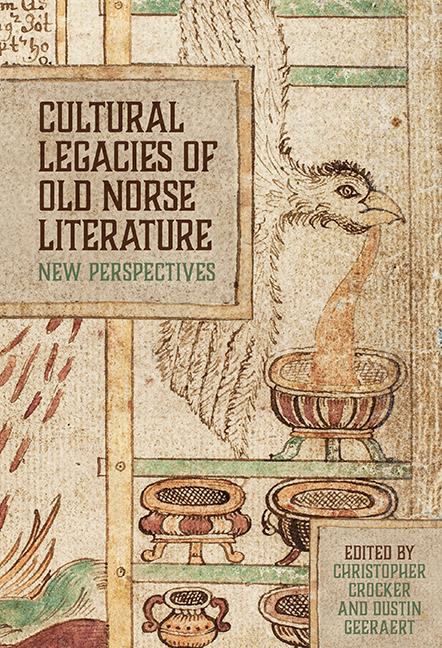Book contents
- Frontmatter
- Contents
- List of Illustrations
- List of Contributors
- Foreword: Old Norse and the Porous Boundaries of Medievalism
- Acknowledgements
- Note on the Text
- Introduction
- 1 Dr Jekyll and Mr Hyde in Medieval Iceland: Saga Realism and the Sworn Brothers
- 2 The Malleability of the Past: Íslendingabók as Narrative History
- 3 Women’s Work and Material Culture in Medieval Iceland: Gender, Narrative, and Cloth Production
- 4 Vafþrúðnismál, from Parchment to Print: Stability and Change in the Transmission of Eddic Poetry
- 5 The Odinic Motif: The Wanderer in the Mist
- 6 What has Darwin to do with Óðinn? Shapeshifting, God, and Nature in the ‘Great Story of the North’
- 7 Madness, Mythology, and Mitteleuropa: Günter Grass’s Transformation of Old Norse Myth in The Tin Drum
- 8 Once More, with Fiction: Transforming Myth in Gerður Kristný’s Blóðhófnir and the Eddic Poem Skírnismál
- Afterword: Ethnographic Medievalisms
- Bibliography
- Index
Introduction
Published online by Cambridge University Press: 08 October 2022
- Frontmatter
- Contents
- List of Illustrations
- List of Contributors
- Foreword: Old Norse and the Porous Boundaries of Medievalism
- Acknowledgements
- Note on the Text
- Introduction
- 1 Dr Jekyll and Mr Hyde in Medieval Iceland: Saga Realism and the Sworn Brothers
- 2 The Malleability of the Past: Íslendingabók as Narrative History
- 3 Women’s Work and Material Culture in Medieval Iceland: Gender, Narrative, and Cloth Production
- 4 Vafþrúðnismál, from Parchment to Print: Stability and Change in the Transmission of Eddic Poetry
- 5 The Odinic Motif: The Wanderer in the Mist
- 6 What has Darwin to do with Óðinn? Shapeshifting, God, and Nature in the ‘Great Story of the North’
- 7 Madness, Mythology, and Mitteleuropa: Günter Grass’s Transformation of Old Norse Myth in The Tin Drum
- 8 Once More, with Fiction: Transforming Myth in Gerður Kristný’s Blóðhófnir and the Eddic Poem Skírnismál
- Afterword: Ethnographic Medievalisms
- Bibliography
- Index
Summary
Here we describe the ‘Asgard’ superphylum, a group of uncultivated archaea that, as well as Lokiarchaeota, includes Thor-, Odin- and Heimdallarchaeota.
Katarzyna Zaremba-Niedzwiedzka et al.The cultural legacies of Old Norse literature, predominantly preserved in Iceland, now appear in a vast array of forms, inspiring scholars and scientists, writers and poets, philosophers and artists of all kinds. Archaeota, ancient life forms which are found only in ocean-floor lava vents, have recently been given names drawn from Old Norse mythology, for example. Likewise, the name of the Old Norse giant who may also be counted as a god, Loki, is now also the name of a perpetually erupting volcano on Io, one of the moons of Jupiter, which displays an unpredictable rhythm: ‘The channel seems to stay open continuously… And yet Loki still changes over time to its own beat’. Examining the complex origins, history, transmission, interpretation, and influence of Old Norse literary works reveals not only preservation, but also transformation.
The studies in this collection explore the diverse and rich legacy of Old Norse literature, including its myths, sagas, poems, and histories, from the perspectives of literary criticism, book history and codicology, archaeology, mythology, and folklore, among others. Some studies consider the influence of Old Norse literature in modern poetry, prose literature, and other creative fields, while others challenge the foundations of established critical perspectives on Old Norse literature and its underlying literary culture, offering new critical insights in turn. All share a common concern with both preservation and transformation – the latter being a complex process of challenge, change, adaptation, and continuity. These themes can be found in a remarkable Old Norse myth of transformation, one which envisions an act of divine theft as the ultimate foundation for both poetry and scholarship.
A brief account of this myth appears in the eddic poem Hávamál (Sayings of the High One) in the form of a boastful confession by the Norse god Óðinn (Odin). The same narrative is also alluded to in a number of kennings found in skaldic poetry. The most complete version, however, occurs within Skáldskaparmál (Poetic diction), a handbook for skálds (poets) which is attributed to Snorri Sturluson (1179–1241), the prominent Icelandic chieftain, poet, historian, and mythographer who remains a simultaneously definitive and elusive authorial figure in Old Norse literature.
- Type
- Chapter
- Information
- Cultural Legacies of Old Norse LiteratureNew Perspectives, pp. 1 - 7Publisher: Boydell & BrewerPrint publication year: 2022



